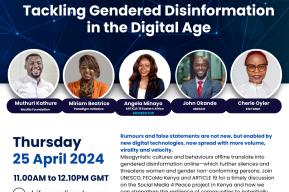News
ECOWAS region judges trained on freedom of expression, artificial intelligence, and the rule of law

UNESCO Accra office organized a workshop on from December 3-6, 2023, in Accra to strengthen the skills of 30 judges and magistrates from Ghana (20), Sierra Leone (5), and Liberia (5) on regional and international standards on freedom of expression, artificial intelligence, and the rule of law. The training is against the backdrop of an Artificial Intelligence Needs Assessment Survey in Africa carried out by UNESCO in 2020 to ascertain the policy goals and capacity building requirements of thirty-two African countries. The survey resolved on enhancing capacities for AI governance at the legislature, the executive, and the judiciary levels as a priority.
The 30 judges, out whom 16 were females and 14 males, were also taken through sessions on the protection of the safety of journalists. The session exposed the participants to how freedom of expression and the safety of journalists are guarded within the framework of regional and international standards as interpreted by UN Human Rights Committee and the African Commission/Court on Human and Peoples’ Rights.
During the workshop, participants were presented with Global Toolkit for Judicial Actors to help contextualize participants learning experiences. The judges also shared their impressions about the training. A Court of Appeal judge from Ghana, Justice Jennifer Abena Dadzie, emphasized the relevance of training judicial actors particularly in the light of evolving technologies.
This programme has been thought-provoking and educative; it has equipped us, as judges necessary tools to navigate the contours of the area freedom of expression, while using new and emerging technologies.
Other participating judges, Counsellor Darryl Ambrose Nmah, Sr., Director of Public Information-Judiciary Branch from Liberia, and Her Honour Sedinam Awo Balokah, a Ghanaian circuit court judge, expressed their impressions about the workshop.
Judicial guarantee of free speech and freedom of the press is the pivot of democracy and societal development in Africa.
As Administrators of justice, UNESCO’s workshop affords us an in-depth and broader knowledge of the constitutionally enshrined provisions on freedom of expression and its consequences on a fledgling democracy like Ghana, especially with respect to media rights, free speech and the use of the internet in this regard.
At the opening ceremony, the Minister of Information, Hon. Kojo Oppong Nkrumah, emphasized the role of freedom of expression as the cornerstone of democratic societies and urged duty bearers to create an environment where journalists can carry out their work without fear of violence or intimidation. The Minister reiterated the urgent need to reproach perpetrators of attacks on journalists to provide a conducive atmosphere for journalism practice in the country.
We must condemn any form of violence against journalists and take concrete steps to provide them with the necessary protection and support.
The Director of the Ghana Judicial Training Institute, Justice Amadu Tanko, who represented the Chief Justice at the opening ceremony, bemoaned yellow journalism as a factor that continues to frustrate the dividends countries could reap from the pivotal role of the media in national growth and development. The Director of the training institute cautioned that, while condemning the activities of yellow journalism, attacks and threats on journalists and the media is never an option and must not be encouraged. He urged all persons affected by bad journalism to seek redress through the appropriate state organs and the formal Courts system.
The Country Representative of UNESCO to Ghana, Mr. Edmond Moukala, added that for UNESCO to advance its course of promoting fundamental human rights, it is critical to build the capacity of judicial actors to be well versed in freedom of expression challenges both online and offline. Mr. Moukala hinted about the likelihood of collaborating with the Judicial Training Institute of Ghana to make it a centre of excellence training on human rights issues.
In the coming months, UNESCO, through mutual partnership, will collaborate with the Judicial Training Institute (JTI) to begin training of trainers (ToT), which will lead to JTI becoming a center on human rights training in the sub-region.
The training, funded by the Multi-Donor Programme on Freedom of Expression and Safety of Journalists through UNESCO’s Multi Sectoral Regional office in Dakar, aims to build a judicial system that ensures an enabling environment for freedom of expression, access to information, and the safety of journalists.
The training was part of UNESCO’s Judges Initiative, that since 2013 has raised the capacities of judicial actors on international and regional standards on freedom of expression, access to information and the safety of journalists in over 160 countries around the world. Over 36,000 judicial actors, including judges, prosecutors, and lawyers, from over 160 countries have been trained on these issues, notably through a series of Massive Open Online Courses (MOOCs), on-the-ground training and workshops for Supreme Court judges, and the publications of a number of toolkits and guidelines









